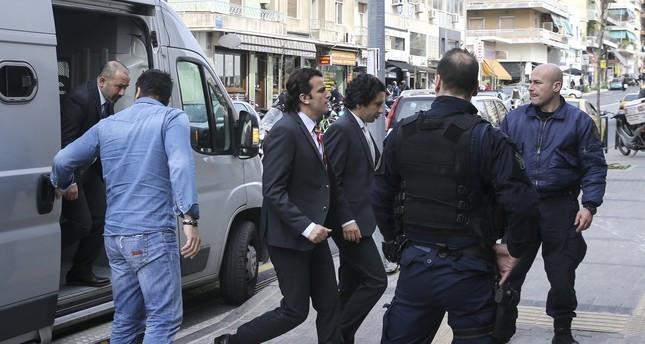
The Greek government applied to the administrative court of appeal on Jan. 2 to invalidate a decision by the country’s Asylum Appeals Authority granting asylum to one of the eight Turkish officers who fled to Greece in a military helicopter after a failed coup in Turkey in July 2016, Reuters has reported.
The government’s move came after Süleyman Özkayakçı was released early on Dec. 30, 2017 from a police precinct where all eight officers have been held pending consideration of their asylum requests.
The Greek prime minister’s office announced later on Dec. 30, 2017 that “following [the government’s] established position on the eight Turkish military officers” it will seek to invalidate the authority’s decision, which was handed down on Dec. 29, 2017.
The decision of the Appeals Authority, an independent panel made up of two judges and a law professor, was expected as Greece’s Supreme Court had refused to extradite the officers in January 2017, arguing they were unlikely to face a fair trial in Turkey.
The Turkish Foreign Ministry on Dec. 30, 2017 slammed the decision granting asylum to Özkayakçı, calling the decision a political one rather than a judicial one, a “violation of international legal norms and principles” and another indication of Greece’s reluctance to fight terrorist organizations.
“Greece, who granted asylum to one of the eight coup plotters who participated in the July 15 coup bid, has once again revealed through this decision that it is a country that protects and embraces plotters,” the ministry said in a written statement.
Greek government spokesman Dimitris Tzanakopoulos on the other hand, has said the eight Turkish officers “will not be extradited regardless of the outcome of their asylum applications.”
In an interview with the EPT1 TV channel on Jan. 2, Tzanakopoulos said the country’s highest court had already blocked Ankara’s request for the extradition of soldiers, Greek media has reported.
“They cannot be extradited, regardless of the outcome of their asylum applications,” Tzanakopoulos said, adding that their asylum applications were a “different matter.”
“There is nothing secret here,” he said.
The spokesman had already spoken of this issue in a social media post late on Dec. 31, 2017. “The issue of extradition has concluded. The eight will not be extradited, regardless of the course of their asylum requests,” said Tzanakopoulos in a tweet.
Özkayakçı, the co-pilot at the center of the tension landed in the Greek city of Alexandroupoli, not far from the Turkish border, hours after the coup attempt was defeated on July 15, 2016, and had denied being part of the coup attempt.
The case has caused tension between the two NATO allies. The Turkish Foreign Ministry had previously said failure to extradite the group could have an impact on its ties with Athens, including cooperation in the fight against terrorism and other regional issues.